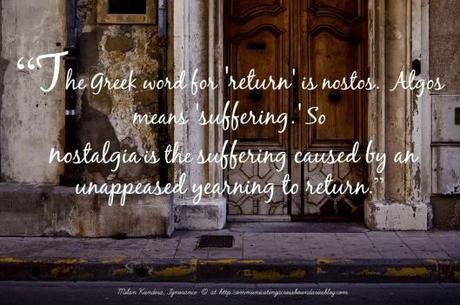
“Sometimes I’m so homesick I can’t get out of bed. Especially in the winter.” This was said to a colleague of mine by a Brazilian patient a few years ago after the health center she worked for decided to change a depression survey to add these two questions:
Do you ever get homesick?
What do you do when you get homesick?
A recent quote I read about nostalgia echos the words and thoughts of this woman. “The Greek word for “return” is nostos. Algos means “suffering.” So nostalgia is the suffering caused by an unappeased yearning to return.”*
This patient had an unappeased yearning to return, a longing for what no longer is, a ‘saudade’.
At a wedding this fall I met a woman who had moved back to the United States after living in Afghanistan for 10 years. “Do you miss it?” I asked. She stopped and looked at me full on. “Thank you so much for asking me” she said. “Yes – I miss it so much. So much. And no one has asked me this. Not one person has asked me if I miss Afghanistan this past year.”
An unappeased yearning to return.
A few years ago I sat beside an elderly patient who had lost her husband, her children far away and busy with their own lives. “I look at pictures and I have sweet memories. And oh how I miss those days when I was surrounded by family, in my home.” There she sat in a small apartment for the elderly, her phone beside her so she wouldn’t miss the call that just might come through.
A longing for what no longer exists.
I see these longings for what no longer exists with immigrants, with refugees, with the elderly. I also see it with former expats and third culture kids. They have an unappeased yearning to return. They don’t live in this on a daily basis, instead it comes in strange waves at inopportune times, loneliness and nostalgia rushing up on them like a hot blush, from toe to head. It can be mistaken by the uninitiated for a discontent, an inability to adjust. But I think that reduces the feelings and fails to acknowledge the complexity of those feelings. This unappeased yearning is not wrong and it doesn’t mean we are not fully living. This is the mistake I have made in the past – confusing the longing with restlessness, with a fretful inability to function properly.
But I have realized something important: we can be content and well-adjusted to a place and yet still have a longing for the places we came from, the places where we will never return.
Yes, for some, like the example of the patient, it results in a temporary inability to function. But for more people it sits in the soul, under the surface, not affecting activities of daily living, but silently accompanying us wherever we go. And there are things that help to calm and tame these feelings. Stories with old friends, either in person or through phone calls; inhaling memories through a favorite meal at a restaurant that smells like ‘home’; even a language class where you revive some of the skills that are laying dormant.
More and more I see this as a gift in our world. Because this is what makes us human. This is what can connect us to each other. When we are fully at home and secure we are unaware of the journey of others. We can ignore the lonely, walk by the homeless without a thought, dismiss the one who is ‘other’. But when we are in tune with our nostos and algos we can stretch out a hand to those who walk the journey with us.
What do you think? Have you experienced an unappeased yearning to return? How can it be a gift?
*Milan Kundera


